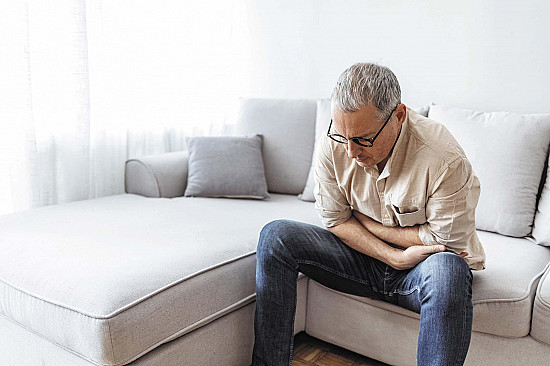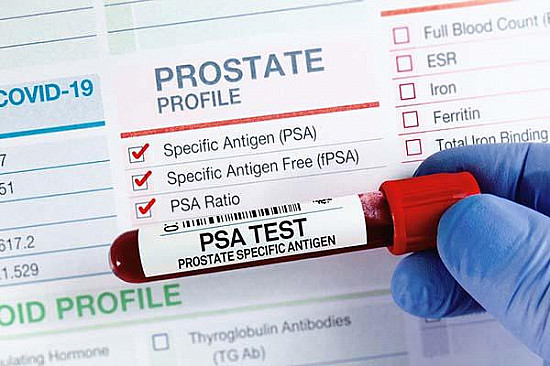Stress and benign prostatic hyperplasia (BPH)
Science shows there may be a connection
Men with benign prostatic hyperplasia (BPH) often find the condition stressful, and it’s easy to understand why. Urinary urgency that triggers a frantic hunt for a bathroom will jangle even the most relaxed fellow, and nighttime urination that interrupts sleep can only add to mental distress. If the symptoms of BPH can cause stress, is the reverse also true? Can the stress of recent stock market losses and the need to postpone retirement, for example, contribute to BPH or worsen its symptoms? Might stress affect the prostate in other ways?
At first, the idea might seem far-fetched. But doctors have learned that mental stress can have a hand in many medical conditions, ranging from palpitations, heart attacks, and hypertension to asthma, heartburn, colitis, and skin rashes. Even so, the prostate has long been considered exempt from psychic influences. Two reports may begin to modify that view — and spark additional research on the connection between stress and prostate health.
Finding a connection
In a 2005 study of stress and the prostate, doctors evaluated 83 men with an average age of 68. The men had all been diagnosed with BPH (see Figure 1, below) and were enrolled in the Medical Therapy of Prostatic Symptoms (MTOPS) study at the University of Iowa. MTOPS was designed to assess the effectiveness of two drugs commonly used to treat BPH — finasteride (Proscar) and doxazosin (Cardura). As a result, some of the patients in the ancillary stress study were taking medication for BPH while others were not.
Figure 1: An inside look at BPH
As the prostate gland enlarges, it constricts the urethra, the tube that carries urine out of the body, impeding urine flow. The bladder has to work harder to force stored urine out. Over time, the bladder walls thicken, leaving less and less room for urine. |
Each man underwent a complete urologic evaluation that included ultrasound measurements of his prostate and of the amount of urine that remained in his bladder after normal urination. (A larger prostate and a higher amount of retained urine may indicate more severe BPH.) All the men also completed questionnaires designed to measure total lifetime stress, recent stress, and hostility.
BPH progresses over the course of a man’s later years. But lifelong stress did not appear to stimulate growth of the prostate. If anything, men who reported high levels of total lifetime stress tended to have slightly smaller glands than their more placid peers. Recent stress was another matter. Men who reported high levels of recent stress had more difficulty emptying their bladders than men who had not experienced recent stress. And hostility appeared to exacerbate the effects of recent stress; men with both factors had the largest post-voiding residual urine volumes.
In a 2007 report on the same group of 83 men, researchers compared objective measurements of prostate size and function with several indicators of stress as revealed on questionnaires. To see if physiologic evidence of mental stress also corresponds to BPH symptoms, they asked the men to take a mental stress test. The volunteers were given two minutes to prepare a speech defending themselves against an accusation of shoplifting, after which they delivered the speech in front of a video camera. To measure the stress response, the scientists monitored blood pressure and stress hormones throughout the test. The men whose diastolic blood pressure showed the strongest reactivity to mental stress also reported the most severe BPH symptoms, and they also retained the largest amounts of urine after voiding. High stress hormone reactivity was also associated with high scores on questions about the impact of symptoms. (To read the details of these studies on your own, see “Stress and BPH findings,” below.)
Stress and BPH findingsUllrich PM, Lutgendorf SK, Kreder KJ. Physiologic Reactivity to a Laboratory Stress Task Among Men with Benign Prostatic Hyperplasia. Urology 2007;70:487–91. PMID: 17905102. Ullrich PM, Lutgendorf SK, Leserman J, et al. Stress, Hostility, and Disease Parameters of Benign Prostatic Hyperplasia. Psychosomatic Medicine 2005;67:476–82. PMID: 15911913. |
The studies describe two possible links between the mind and the prostate. One involves the body’s hormones. A part of the brain called the hypothalamus controls the endocrine system’s “master gland,” the pituitary. In turn, the pituitary regulates the production of many hormones, including the male hormone testosterone. Testosterone is converted to the hormone dihydrotestosterone, or DHT for short, by the enzyme 5-alpha reductase, which is found in prostate cells. Testosterone and DHT can encourage prostate growth. That’s why long-term changes in the hypothalamic-pituitary-testicular connection (also called the hypothalamic-pituitary-gonadal axis, or HPG axis) could cause the prostate to grow. It also explains why doctors prescribe drugs called 5-alpha-reductase inhibitors — finasteride (Proscar) and dutasteride (Avodart) — to treat BPH (see Table 1, below). But in the 2005 MTOPS study, men with greater long-term stress had smaller prostates, not larger ones.
The other possibility involves the sympathetic nervous system. Stress triggers the release of adrenaline. The prostate and the bladder neck contain alpha receptors that respond to adrenaline by stimulating smooth muscle cells in the prostate and bladder (see Figure 2, below). When the muscle cells contract, they narrow the urethra, slowing the flow of urine and preventing the bladder from emptying completely. That’s why cold remedies that contain pseudoephedrine or other medications that activate alpha receptors can make it difficult for men with BPH to urinate. And it also explains why many men with BPH get symptomatic relief from alpha blockers (see Table 1, below) such as terazosin (Hytrin), doxazosin (Cardura), tamsulosin (Flomax), alfuzosin (Uroxatral), and silodosin (Rapaflo).
Figure 2: The prostate and its nerves
A rich network of nerves surrounds the prostate and may explain the link between stress and prostate-related symptoms. Responding to adrenaline, muscles may tense and contract, compressing the urethra and resulting in a greater volume of residual urine. |
The sympathetic nervous system may also play a role in the link between hypertension (high blood pressure) and symptoms of BPH, according to a report from Dutch scientists. Since hypertension may indicate increased activity of the sympathetic nervous system, high blood pressure and stress could share a common mechanism for increasing the severity of BPH.
The MTOPS reports raise interesting questions, but they do have limitations. Since the men already had BPH when they entered the study, it might be hard to detect long-term factors that could promote (or protect against) BPH. And since some patients were already on BPH medication at the time of the study, the possible effects of stress might have been blunted.
Table 1: Prescription drugs for BPHMedication can help many men relieve the symptoms of BPH, such as an urgency to urinate, frequent urination, and the feeling that the bladder hasn’t completely emptied. This table summarizes the current BPH medications. |
||
| Medication | Potential side effects | Comments |
| Older alpha blockersdoxazosin (Cardura, generic)
terazosin (Hytrin, generic) Selective alpha blockers alfuzosin (Uroxatral) tamsulosin (Flomax, generic) silodosin (Rapaflo) |
Nasal congestion, dizziness, headache, or fatigue sometimes occur. Dry mouth and swelling in the ankles are less common. Low blood pressure, although rare, may pose a problem for some men using doxazosin or terazosin. Decreased ejaculate volume may occur. | Doctors should prescribe a low dose of doxazosin or terazosin, and then increase gradually if needed. This approach isn’t necessary for tamsulosin and alfuzosin because these drugs do not lower blood pressure. Men taking silodosin may notice a drop in blood pressure upon standing. |
| 5-alpha-reductase inhibitorsdutasteride (Avodart)
finasteride (Proscar, generic) |
Although uncommon, decreased libido, decreased ejaculate volume, and impotence may occur. | These drugs help shrink larger prostate glands and reduce the need for surgery. They aren’t beneficial for small prostates. They are also slow to act, taking up to two years to see full benefits. They can lower PSA levels considerably, too. |
Reducing the stress of BPH
Stress may aggravate the symptoms of BPH — and having BPH can be plenty stressful on its own. Until recently, many doctors recommended surgery for BPH, regardless of whether or not the patient was stressed or distressed by his symptoms. That’s no longer the case. For one thing, medication has replaced surgery as the first treatment for most men with BPH. In addition, even medication is usually held in reserve until a man finds his BPH symptoms bothersome.
Whether or not your doctor has prescribed medication, taking these simple steps can help you reduce the stress caused by symptoms of BPH:
- Reduce your intake of fluids, particularly after dinner.
- Limit your intake of alcohol and caffeine and avoid them after midafternoon; both are diuretics that increase urine flow.
- Avoid medications that stimulate muscles in the bladder neck and prostate. Decongestants are the chief culprits.
- Avoid medications with anticholinergic properties that weaken bladder contractions. Antihistamines are the most common offenders. Ask your doctor if any medications you take might be causing a problem.
- If you are taking a diuretic, ask your doctor to consider reducing your dose or substituting another medication that will work just as well.
- Don’t let your bladder get too full. Over time, stretching will weaken your bladder muscle, increasing your risk of acute urinary retention.
- Never pass up a chance to use the bathroom, even if your bladder does not feel full. Plan to stop at regular intervals during car trips.
- In a new place, find the bathroom before you need it.
- Request aisle seats on airplanes, in theaters, and at sporting events.
- Be sure there are no obstacles between your bedroom and your bathroom. Keep night-lights on so you won’t stumble or fall when you get up to urinate at night, but avoid bright lights and other stimuli that can activate your nervous system and make it harder for you to get back to sleep.
Reducing stress in other parts of your life
Like everyone else, men with BPH have stress in other parts of their lives. Work-related demands can cause stress to mount, especially in these tough economic times. Throw in family responsibilities and financial worries, and stress can get the better of anyone. Stress management techniques include exercise, breath focus, body scan, proper nutrition, and self-nurturing.
Exercise
You can use exercise to stifle the buildup of stress in several ways. When you exercise shortly after you feel stress — by sprinting away from an oncoming bus, for example — you burn off the hormones produced in response to stress just as nature intended. Just about any form of motion helps relieve pent-up muscle tension. And certain activities, such as yoga, tai chi, or qigong, and repetitive exercises, such as walking, running, or rowing, elicit relaxation, too. Regularly engaging in these kinds of activities can help you ward off everyday stress.
Breath focus
Find a comfortable, quiet place to sit or lie down. Take a normal breath. Now try taking a slow, deep breath. The air coming in through your nose should move down toward your lower belly. Let your abdomen expand fully. Now breathe out through your mouth. Alternate normal and deep breaths several times. Pay attention to how you feel when you inhale and exhale normally and when you breathe deeply. Shallow breathing often feels tense and constricted, while deep breathing produces relaxation.
Now practice diaphragmatic breathing for several minutes. Put one hand on your abdomen, just below your belly button. Feel your hand rise about an inch each time you inhale and fall about an inch each time you exhale. Your chest will rise and fall slightly, too, in concert with your abdomen.
Now move on to the regular practice of breath focus. As you sit comfortably with your eyes closed, blend your breathing with helpful imagery or focus on a word or phrase that will help you relax. Imagine that the air you breathe in washes peace and calm into your body. As you breathe out, imagine that the air leaving your body carries tension and anxiety away with it. When you first start, 10 minutes of breath focus is a reasonable goal. Gradually add time until your sessions are about 15 to 20 minutes long.
Body scan
Body scan incorporates breath focus and visualization to help you eliminate tension. The technique helps you become more attuned to your body and aware of the connection between your mind and body.
Performing a body scan is easy. To start, sit or lie down. Practice breath focus for two minutes. Then concentrate on your right big toe. Imagine the atoms in your toe and focus on the space between each atom. Imagine your toe feeling open, warm, and relaxed. Shift your focus to each of the other toes on your right foot, visualizing them one by one. Again, notice the sensations of your toes and envision them as open, warm, and relaxed.
Slowly shift your focus to your foot, moving mentally from the ball of your foot to the arch, then the top of the foot. Work your way up your leg, turning your attention to your ankle, calf, knee, thigh, hip, and so on. Take your time, slowly working through each area, on each side of your body, up to the top of your head.
As you move from one part of your body to the next, let your whole body sink into your chair or bed. Imagine yourself breathing in calm and peace. As you breathe out, imagine any remaining tension being expelled from your body. When you are finished, sit or lie quietly for a few minutes, noting how light your body feels.
Proper nutrition
The food choices you make can feed your stress or ease it by truly nourishing your body. In general, eat from smaller plates; large plates encourage bigger helpings. Avoid “seconds,” too. If you’re still hungry, eat fruit instead.
Snacking is a pitfall for people under stress. Before snacking, ask yourself if you are really hungry or whether anxiety or stress is driving your desire to eat. If you feel stressed, find another way to relax, like going for a walk or calling a friend. Also, try drinking a glass of water to see if that satisfies you.
If you are hungry, dole out an appropriate-size serving and eat that, instead of snacking directly out of the box. And instead of surrounding yourself with temptation, such as several cartons of ice cream in the freezer, stock the refrigerator with fresh fruits, vegetables, and healthy treats.
Nurture yourself
There is no single technique for nurturing yourself, but the spark you gain from nurturing your imagination, career, relationships, or spiritual side amplifies the healing effects of other stress-relief techniques. Some options for self-nurture include journal writing, prayer, and expanding and strengthening your social bonds by reconnecting with a friend, volunteering for a nonprofit organization, or taking a class. Finding time for leisurely pursuits, such as reading a novel or soaking in a hot bath, can help, too.
Bye-bye, BPH?
Will a hot bath, the latest thriller, and fewer after-work cocktails put an end to BPH? Probably not. Although some studies have looked at the link between relaxation techniques and the production of chemicals that can help quell pain (see “Relaxation techniques and protective chemicals”), none have examined the impact of stress management programs on BPH. Even so, anecdotal evidence suggests that stress reduction may ease prostate symptoms, and limiting stress certainly won’t make symptoms worse. Plus, stress management could offer a host of other health benefits.
Relaxation techniques and protective chemicalsCan relaxation techniques boost the production of certain substances that protect the body from illness and help stifle pain? Research suggests that they can. In 2005, a team of Harvard Medical School researchers found that the relaxation response is associated with production of nitric oxide, a substance that offers a variety of health benefits. Researchers measured oxygen consumption and nitric oxide exhalation in participants at the start of the trial, then again after eight weeks of training in the relaxation response, which is the opposite of the stress response. Although there was no correlation between the two measurements at the beginning of the program, by the end, oxygen consumption had decreased in proportion to an increase in nitric oxide production in the people who used the relaxation response. A similar change wasn’t observed in a control group. What are the benefits of nitric oxide? In a 2001 study, researchers investigated its multifaceted role. This molecule is present in human tissues and is best known for dilating blood vessels — particularly those involved in creating erections. But it performs other vital functions as well. It acts as a signaling molecule shuttling communications between key body systems, dampens the activity of certain immune cells, and inhibits blood clotting. It also has antibacterial and antiviral properties. In fact, it stimulates activation of an enzyme that leads to the release of enkelytin, an antibacterial peptide, and enkephalins, compounds that enhance mood, reduce pain perception, and stimulate some immune system cells. To the researchers, this suggested that having sufficient levels of nitric oxide offers potential protection against microbes, health problems such as hypertension, and overzealous activity in the immune and vascular systems. |
Originally published July 1, 2009; Last reviewed April 20, 2011
About the Author
Disclaimer:
As a service to our readers, Harvard Health Publishing provides access to our library of archived content. Please note the date of last review or update on all articles.
No content on this site, regardless of date, should ever be used as a substitute for direct medical advice from your doctor or other qualified clinician.

















